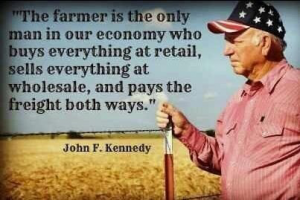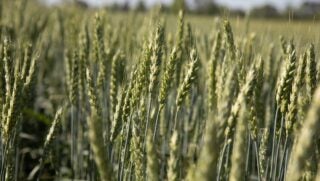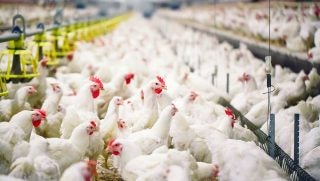I’m gonna put it all out there, y’all. It’s been a tough year, and it’s not looking to get better anytime soon.
For those unaware, an exceedingly large number of farmers are going through a really tough time right now. Tariffs have come into play for many farm commodities, and they’re hitting agriculture hard. As one example, we grow corn on our farm, which recently dropped to $2.97 a bushel, which is 56 pounds of corn. Prices for corn haven’t been this low in years, yet the price of farming continues to rise every year. Over 90 percent of dairy farms have gone out of business over the last four to five decades — the big guys get bigger, the smaller guys continue to struggle, and a vast majority of U.S. farmers have to have off-farm income in order to survive. As some farmers lose money every day to milk their cows, many of them are receiving suicide prevention letters, as farming has one of the highest rates of suicide and is considered one of the most dangerous jobs in the world, according to the Bureau of Labor Statistics.
I hate talking about this, but something needs to be said. More awareness needs to be raised, politicians and the general public need to have a better grasp on reality, appreciate where their food comes from, thank a farmer, and overall do whatever they can to support those who feed and clothe us. Farmers and ranchers work sun up to sun down with continued debt, breakdowns, and daily struggles to meet the demands of the growing population.
There are also a couple of myths out there that need to be addressed behind politics and subsidies. There is a myth out there that farmers receive government handouts to grow certain crops or get “bailed out,” but this just isn’t true. It’s factual that a small amount of direct pay subsidies existed years ago, but some of that money literally kept farmers from going out of business, through no fault of their own because elements out of their control, such as weather, a changing cost to operate, and grain prices. Yes, sometimes farms get discounts on stuff like crop insurance, but those discounts on insurance programs that cost tens of thousands of dollars is a very small drop in the bucket for a farm with millions in operational costs. Rarely can someone just wake up one day and say, “I want to be a farmer” — you arguably have to be born into it to have a fair shake. As former president John F. Kennedy said: “The farmer is the only man in our economy who buys everything at retail, sells everything at wholesale, and pays the freight both ways.”

For those of us who farm as the younger generation, say under 40, this may be the first time they’ve gone through a farm crisis this rough. There are days where we wake up crying, wondering what will happen to the multi-generation family heritage. Then there’s the stress and anger towards politics. If there’s one pet peeve I have, it’s when people say, “Well farmers voted for Trump, you got what you deserve!” Oh puh-lease. Don’t lump them all into one category — there are plenty of farmers who do not support Trump, there are some who will always love him, and there’s some who regret they voted for him. Anyway, it’s not that simple. Farming has always had its ups and downs, regardless of who’s been in office, and the economics of ag are extremely complex. My advice? Keep politics out of the discussion and don’t paint farmers with one broad brush. They only make up 1.5 percent of the population anyways … they’re the large swath of the country that got him elected. It takes a village, the UNITED states.
So go easy on the farmers at this time. During a recent heated discussion that turned ugly and political, I had to lean on one of my favorite Facebook groups for support during this tough time, and I’m glad I did. One word of advice I received from the group is to talk to the older generation who have been through this before and see how they did or did not make it through. It can be incredibly hard to watch someone you care about struggle to hold back the tears of everything they worked hard for, while realizing there’s so much out of their control. The advice I received from my favorite farmers market couple with 50+ years of marriage was, “Chill out. Let him be quiet. Let him internalize things.” This is a time where they don’t know what will come from their farms, these people are literally losing their identity, seeking additional jobs on top of the farm (with what time and sacrifice, by the way?) to try and make ends meet. Don’t take it personal when the farmer may be a bit quiet or grouchy; it’s important to be supportive, positive, and budget properly while cutting spending as much as possible.
I may not be an ag economist, but Christopher Hurt from Purdue University is. And he’s seen this economic crisis coming, similar to the farm crisis of the ‘80s. He puts it into perspective: Several years ago a 1,000-acre farm could expect about a $42,000 return. Now that same farm could be negative $126,000 this year. That’s a huge loss, and many farmers won’t make it through. While the workers making burgers at your local fast food restaurant would like minimum wage to be $15 an hour, the push for change shouldn’t stop there. How is it fair that the rancher who produced that beef could be losing money every day for some things out of their control? It makes no sense and frankly makes me sick.
Don’t get me wrong, there are years where it can be good, too, but farming is always a gamble. It’s not an easy business, and we shall see how everything pans out. Please be mindful of your food and be kind to the people who produce it. They need all the support they can get right now.
Michelle Miller, the Farm Babe, is an Iowa-based farmer, public speaker, and writer, who lives and works with her boyfriend on their farm, which consists of row crops, beef cattle, and sheep. She believes education is key in bridging the gap between farmers and consumers.



